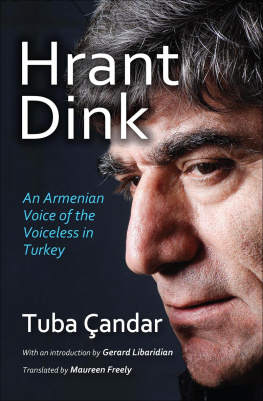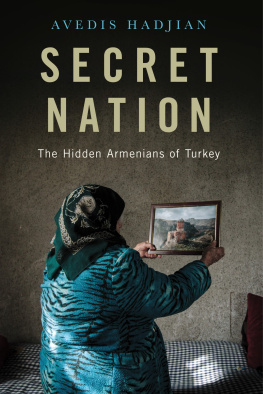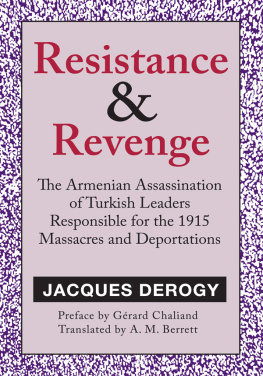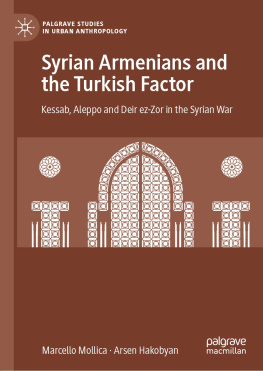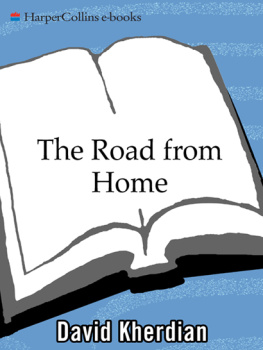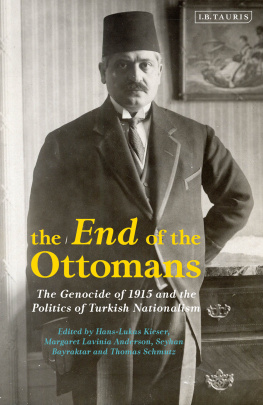Hrant
Dink
Armenian Studies
Series Editor, Gerard J. Libaridian
Marian Mesrobian MacCurdy
Sacred Justice: The Voices and Legacy of the Armenian
Operation Nemesis
Aye Gl Altnay and Fethiye etin
The Grandchildren: The Hidden Legacy of Lost Armenians
in Turkey
Seta B. Dadoyan
The Armenians in the Medieval Armenian World: Paradigms
of Interaction
Volume One: The Arab Period in Arminyah, Seventh to Ninth Centuries
Seta B. Dadoyan
The Armenians in the Medieval Armenian World: Paradigms
of Interaction
Volume Two: Armenian Realpolitik in the Islamic World, Eleventh to Fourteenth
Centuries
Seta B. Dadoyan
The Armenians in the Medieval Armenian World: Paradigms
of Interaction
Volume Three: Medieval Cosmopolitanism and Images of Islam,
Thirteenth to Fourteenth Centuries
Fuat Dndar
Crime of Numbers: The Role of Statistics in the Armenian Question
(1878-1918)
Dikran Mesrob Kaligian
Armenian Organization and Ideology under Ottoman Rule: 1908-1914
Lisa Khachaturian
Cultivating Nationhood in Imperial Russia: The Periodical Press and the
Formation of a Modern Armenian Identity
Transaction has been publishing works in Armenian studies for many decades. The titles listed above include only those that have been released under the general editorship specified above since 2008. Other Armenian studies titles include works by Yair Auron, Vahakn Dadrian, Richard Hovannisian, Gerard Libaridian, and others. For more titles, please visit www.transactionpub.com.
Hrant
Dink
An Armenian Voice of the Voiceless in Turkey
Tuba andar
With an introduction by Gerard Libaridian
Translated by Maureen Freely
First published 2016 by Transaction Publishers
Published 2017 by Routledge
2 Park Square, Milton Park, Abingdon, Oxon OX14 4RN
711 Third Avenue, New York, NY 10017, USA
Routledge is an imprint of the Taylor & Francis Group, an informa business
English-langauage edition copyright 2016 by Taylor & Francis.
All rights reserved. No part of this book may be reprinted or reproduced or utilised in any form or by any electronic, mechanical, or other means, now known or hereafter invented, including photocopying and recording, or in any information storage or retrieval system, without permission in writing from the publishers.
Notice:
Product or corporate names may be trademarks or registered trademarks, and are used only for identification and explanation without intent to infringe.
Library of Congress Catalog Number: 2015018191
This volume is based on the much longer work by the author Tuba Candar (Tba andar) originally published in Turkish (Everest Yayinlari, 2010, Istanbul) as Hrant.
Library of Congress Cataloging-in-Publication Data
Gandar, Tuba Tarcan.
Hrant Dink : an Armenian voice of the voiceless in Turkey / Tuba Candar; with an introduction by Gerard Libaridian; translated by Maureen Freely.
pages cm. -- (Armenian studies)
Includes bibliographical references and index.
ISBN 978-1-4128-6255-4 (alk. paper) -- ISBN 978-1-4128-6209-7 (alk. paper) 1. Dink, Hrant, 1954-2007. 2. Armenians--Turkey--Biography. 3. Journalists--Turkey--Biography. 4. Political activists--Turkey--Biography. 5. Armenians--Turkey--Interviews. 6. Turkey--Ethnic relations. I. Freely, Maureen, 1952-, translator. II. Gandar, Tuba Tarcan. Hrant. III. Title. IV. Title: Armenian voice of the voiceless in Turkey.
DR435.A7C362 2016
305.8919920092--dc23
[B]
2015018191
ISBN 13: 978-1-4128-6255-4 (hbk)
ISBN 13: 978-1-4128-6268-4 (pbk)
To Hrant Dink in loving memory
The translation of this work was made possible by a grant from Harry Parsekian, Boston
Contents
Tuba andar
Gerard J. Libaridian
Part V: The Dissident
18 Three Apples Fall from the Sky
Tuba andar
This book is a first: the first biography of Hrant Dink. It is not a classic one. It was Hrants death that convinced me I should seek another way. This was a conscious decision.
Hrant Dink was an Armenian intellectual of Turkey, a journalist and political activist who was targeted for his views and assassinated in front of his news-papers offices in Istanbul on January 19, 2007. First, they tried to drive him from the country with the slogan Love it or leave it. In response, he wrote of feeling as frightened as a pigeon, though I know that in this country of ours, they never hurt pigeons. Before the ink of his pen was dry, they had shot him in the neck. I lived through this terror, pain, and shame, along with everyone else in this country with a conscience. I wrote this book so that Hrant Dink would not be forgotten. I also wrote it to heal my own soul.
And yet, when I first started writing Hrants biography, the pain of losing my friend was still too fresh, too raw. To position myself as an omniscient narrator examining a life from a distance was, quite simply, inconceivable. Nor could I write as if I had witnessed his life firsthand. And so I decided that there would be no single narrator, no overarching I in the book. Instead, I would tell Hrants life story by bringing together the accounts of the closest witnesses of each period of his life. Their voices would construct the book.
Hrant was the first Armenian of Turkey who spoke openly in defense of his peoples minority rights and against the discriminatory policies of the Turkish state. He also spoke for the democratic rights of all citizens of Turkey. This included the right to speak freely of the genocide of Anatolias Armenians in 1915. It was his advocacy of democracy that made him a threat to the Turkish state.
As the founder and editor in chief of the bilingual Turkish-Armenian newspaper Agos, Hrant became the first secular voice of the Christian Armenian minority. He also became one of the countrys most prominent public intellectuals, calling for the democratization of the Turkish political system. He dared to speak and write against all of the taboos of the regime, from the Kurdish question to the headscarf ban, always with the same commitment. In a country where non-Muslim minorities live in closed and anxiously silent communities, this risky undertaking was unprecedented. But until his last day, his courage never wavered.
Hrant was prosecuted three times for insulting and denigrating Turkishness. Many prominent Turkish intellectuals were also brought to court under similar charges. They included Orhan Pamuk, Nobel Laureate in literature; Elif Shafak, another distinguished novelist; and several prominent journalists. While the charges against these others were dropped at the very first hearings, Hrant alone was convicted. This was an act of discrimination, leveled against him solely on account of his being Armenian. Hrant took his case to the Court of Appeals, where his sentence was confirmed six months later. Following this last verdict, the death threats he received became increasingly serious, but the government offered him no protection. Having exhausted internal appeal mechanisms, Dink finally appealed to the European Court of Human Rights to overturn the ruling. Two days later, he was murdered on the pavement in front of his newspapers offices.

